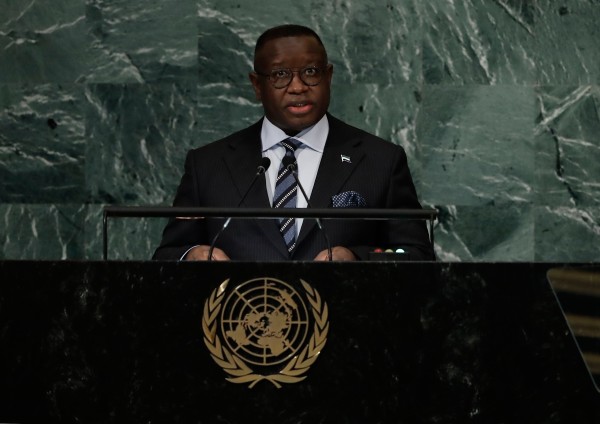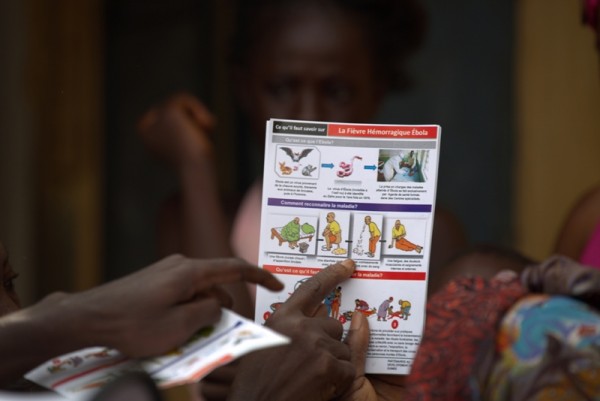The International Press Institute’s executive director, Alison Bethel McKenzie, today issued an open letter to Sierra Leone’s President Ernest Bai Koroma urging him and the government to enact the long-awaited Freedom of Information (FOI) Bill.
The bill, which would give Sierra Leoneans the right to access information from public institutions, has been several years in coming.
A speech delivered in July 2011 by Information & Communications Ministry official Kwame Yankson on behalf of Minister Ibrahim Ben Kargbo showed the comprehensive process behind the creation of this piece of legislation, which has gone through several readings by parliament and technical committees.
But journalists told IPI that whenever there has been a scheduled vote, not enough members of parliament have been present to constitute a quorum.
In an open letter sent by McKenzie from Freetown today, the International Press Institute called on the president to make sure that the actions of his government match their words.
The full text of the letter is below.
President of the Republic of Sierra Leone
State House
c/o The Secretary to the President,
State House
Freetown, Sierra Leone
Email: [email protected]
CC: H.E. Alhaji Ibrahim Ben Kargbo
Minister of Information and Communications
8th Floor, Youyi Building, Brookfields
Freetown, Sierra Leone
c/o Kwame Yankson
Acting Deputy Secretary/Personal Assistant to the Minister
Email: [email protected]
RE: Freedom of Information Bill
Freetown, 24 August 2012
Dear President Ernest Bai Koroma,
I am writing today on behalf of the International Press Institute, a global network of publishers, editors and leading journalists, to request that you do everything in your power to ensure that the Freedom of Information Bill becomes law before the upcoming elections in November 2012. It would be a sign that you and the All People’s Congress (APC) truly stand behind the right of Sierra Leoneans to access public information.
During my visit to Sierra Leone this week, I was grateful to have a chance to meet with the Minister for Information and Communications, Alhaji Ibrahim Ben Kargbo. I also met with officials from the Sierra Leone Association of Journalists, the Guild of Editors, the Independent Media Commission, faculty members of the communications department at Fourah Bay College, University of Sierra Leone, as well as journalists and executives from Premier News, Concord Times, Awoko and Politico newspapers. Through my conversations with these key media players, I understand that the Freedom of Information Bill currently before parliament is taking a long time to pass.
We understand that journalists and other Freedom of Information campaigners have noticed a trend. In recent months, every time a vote on the bill is scheduled, many parliamentarians fail to show up and so the required quorum is not reached. Yet we understand parliament has managed to pass many other laws. Just this week, it passed the Sexual Offences Act, giving women of Sierra Leone some of the legal protections they deserve. With this in mind, it hardly seems coincidental that every time the FOI Bill is up for a vote, not enough representatives show up.
One can imagine why some officials might be reluctant to give Sierra Leoneans the right to access information about their activities. But the Freedom of Information Bill should be welcomed, because it would allow citizens, including journalists, the right to monitor the activities of state institutions and companies. It would give people the right to demand information about how elected officials are using the power and money that the citizens of Sierra Leone provide. This would increase transparency and accountability, and would be a cornerstone in the fight against corruption.
Sierra Leone will hold elections in November 2011.
It would be an important achievement if the government of today were to turn the Freedom of Information Bill into law ahead of that vote, thereby granting future generations of Sierra Leoneans the fundamental right to hold public officials accountable. It would be honourable for parliamentarians to do so without considering whether they will be sitting in the seats of power or the opposition when the law comes into force.
On May 3, World Press Freedom Day, members of the press reportedly marched on the state house calling for passage of the Bill and for the repeal of criminal defamation laws (an initiative which IPI also wholeheartedly supports). According a report in Awoko newspaper, you then promised that the Bill would be passed “pretty, pretty soon,” and said that you would consider amending the 1965 Public Order Act, which criminalizes libel.
We look forward to welcoming Sierra Leone’s new Freedom of Information law in the coming months. We hope it will serve as an example to other countries whose people are also striving for similar legislation.
Your government’s stated interest in passing a Freedom of Information Bill is laudable and puts Sierra Leone miles ahead of many other countries in the region and around the world. But, actions speak louder than words.
Sincerely,
Alison Bethel McKenzie
Executive Director
International Press Institute


